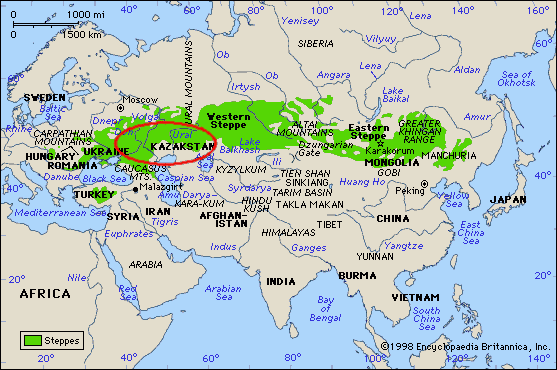hellog〜英語史ブログ / 2011-01-24
01 02 03 04 05 06 07 08 09 10 11 12 13 14 15 16 17 18 19 20 21 22 23 24 25 26 27 28 29 30 31
2011-01-24 Mon
■ #637. クルガン文化と印欧祖語 [indo-european][archeology][kurgan][substratum_theory][tocharian][map][reconstruction]
[2011-01-20-1]の記事で触れたように,印欧祖語 ( Proto-Indo-European ) の起源に関しては諸説が提案されてきた.現在では,ウクライナ,ロシア南部,カザフスタンのステップ地帯に栄えたクルガン文化 ( the Kurgan culture ) の担い手が印欧祖語の話者だったとする説が比較的優勢である.最初にこの学説を唱えたのは考古学者 Gimbutas で,彼女は1963年の論文で従来の印欧語ヨーロッパ起源説に異を唱え,黒海からカスピ海を経てアラル海に渡るステップ地帯が印欧語の故郷ではないかと提起した.考古学についてはまるで門外漢だが,問題の論文を読んでみた.要旨は以下の通りである.
(1) 比較言語学上の前提として,印欧祖語の故郷は Finno-Ugric, Caucasian, Semitic 語族の近隣にあったに違いない.
(2) 印欧諸語のなかで強い類似を示す語派の分布を考慮すると,印欧祖語の故郷は比較的限られた地域に同定される.
(3) ヨーロッパを故郷と仮定した場合,遠く東に分布する Indic 語派や Tocharian ( see [2009-08-06-1], [2009-08-14-1] ) を説明するのに東への大移動が前提となるが,それを示す考古学的な証拠はない.
(4) それに対して,紀元前3千年紀前半のユーラシアステップ地帯には活発な東西文化交流のあったことが考古学的に確証されている.
(5) ここにユーラシアステップ地帯に栄えたクルガン文化の存在が浮かび上がってくる.Kurgan とはロシア語で「塚,古墳」 "barrow" を意味する.この文化の考古学上の最大の特徴は,死者を土を盛った塚に埋葬した点であり,これは西に隣接する北黒海文化 ( the North Pontic culture ) とは著しい対照をなす.

(6) クルガン文化の担い手は長頭で背丈が高くきゃしゃだったとされる.紀元前3千年紀には,すでにいくつかの変種に分かれており,小規模な集団で丘の上で半遊牧的な生活を営んでいたと考えられる.強力な王・貴族によって統治される組織的な集団で,牛車をもっており,紀元前3千年紀後半にはヨーロッパ各地を征服しては自言語を押しつけていった. *
That the Kurgan people succeeded in conquering almost two-thirds of the European continent was probably largely due to their social organization and to the possession of vehicles. (827)
(7) しかし,ヨーロッパ征服のあいだに諸文化の融合が起こり,各地で様々な文化が分化していった.
For about two or three centuries after the Kurgan appearance in Europe, archeology shows a coexistence of different cultural elements, a process of hybridization, a degeneration and a gradual disappearance of local elements. The old cultural patterns tapered off, but the influence of the substratum cultures remained as a strong undercurrent which led to an increased differentiation of the culture and to the formation of a variety of separate groups. (827)
(8) このクルガン分化の担い手こそが,印欧祖語の共通の祖先なのではないか.
I would like to see in the expanding Kurgan people the common ancestors of all Indo-European groups that formed in the successive centuries in Europe and the Near East. (829)
特に重要な点は,クルガン文化は早い段階から分化を起こしていたと推定されていることである.ヨーロッパ征服以前にも北黒海文化やカフカス文化と融合しており,征服以降はますます諸文化と融合してきた.初期から必ずしも一様な集団ではなかったということは,比較言語学上の語の再建形をどのように解釈すべきかという問題にも大きく関わってくる.
常に移動する一様でない文化集団---これは過去だけでなく現在の印欧語族にもあてはまる表現である.
There never was a period of "definitive development and of a final linguistic crystallization"---either in prehistoric, or in historic times. All was fluid, all was and still is changing. (833)
・ Gimbutas, Marija. "Indo-Europeans: Archeological Problems." American Anthropologist 65 (1963): 815--36.
2026 : 01 02 03 04 05 06 07 08 09 10 11 12
2025 : 01 02 03 04 05 06 07 08 09 10 11 12
2024 : 01 02 03 04 05 06 07 08 09 10 11 12
2023 : 01 02 03 04 05 06 07 08 09 10 11 12
2022 : 01 02 03 04 05 06 07 08 09 10 11 12
2021 : 01 02 03 04 05 06 07 08 09 10 11 12
2020 : 01 02 03 04 05 06 07 08 09 10 11 12
2019 : 01 02 03 04 05 06 07 08 09 10 11 12
2018 : 01 02 03 04 05 06 07 08 09 10 11 12
2017 : 01 02 03 04 05 06 07 08 09 10 11 12
2016 : 01 02 03 04 05 06 07 08 09 10 11 12
2015 : 01 02 03 04 05 06 07 08 09 10 11 12
2014 : 01 02 03 04 05 06 07 08 09 10 11 12
2013 : 01 02 03 04 05 06 07 08 09 10 11 12
2012 : 01 02 03 04 05 06 07 08 09 10 11 12
2011 : 01 02 03 04 05 06 07 08 09 10 11 12
2010 : 01 02 03 04 05 06 07 08 09 10 11 12
2009 : 01 02 03 04 05 06 07 08 09 10 11 12
最終更新時間: 2026-01-19 11:07
Powered by WinChalow1.0rc4 based on chalow